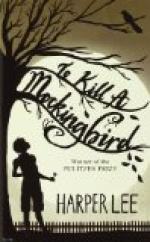|
|
To Kill a Mockingbird Chapter 20
Mr. Raymond was a peculiar man from an old, wealthy family. He lived with a colored woman and was the father to many mixed children, and he staggered around town drinking from a brown paper sack. Mr. Raymond gave Dill a drink from the paper sack and Dill smiled. He told Scout that it was just Coke, and she was confused. Mr. Raymond explained that he bobbed and weaved around town and drank from the paper sack so that people could believe that whiskey was the reason he lived like he did. He didn't expect that they would understand that he lived how he wanted to just because he wanted to, so he gave them something to blame it on. He told them that although Dill was moved to tears by the way the Mr. Gilmer treated Tom Robinson, in a few years Dill would be so accustomed to it that he wouldn't cry anymore. He might not believe it's right, but he wouldn't be as upset over it as he was then. Mr. Raymond then told Scout that she was too young yet to realize that her father wasn't like most other men, but if she'd look around the courtroom, she'd see it.
His reference to the courtroom reminded her that they were missing the cross-examination, so she and Dill said their goodbyes and went back inside. Atticus was making his final statement to the jury, explaining that all that was required for acquittal was reasonable doubt. He reminded the jury that there was no medical evidence that the crime was ever committed, much less that Tom Robinson did it. The only evidence the state had presented was the testimony of two white people whose testimony was contradicted by the defendant and called into serious question in cross-examination. Atticus told the jury that what happened was that Mayella was trying to cover up her shame at tempting a black man by having him executed. She had broken the sacred code that governed the relations between blacks and whites with disregard to the consequences, and to escape her guilt, she was trying to punish Tom Robinson for it. Atticus explained that Mayella crossed a line and her father threatened to kill her for it. He said that it was not known for certain what her father did to her for it, but there is considerable circumstantial evidence that someone beat her up, leading mostly with his left hand because of the marks on the right side of her face. Bob Ewell was left-handed, but Tom Robinson couldn't use his left hand at all. Atticus drew it to a close by explaining that this case came to trial because a Negro felt pity for a white woman and helped her out. For that, he had been forced to come to court and pit his word against two white people's stories, and the white people in the case came into the courtroom and testified with smug certainty. They acted as though whether or not they had any credibility on the stand, they would be believed because the only person who contradicted their story was a black man. Atticus then reminded the jury that the courtroom was the one place where all men truly were created equal. The law was the great leveler, and he expected that the jury would remember that and do the right thing in the name of God and let Tom go home to his family.
Just as Atticus finished his closing arguments, Dill pointed out that Calpurnia was walking up the center aisle to the railing.




